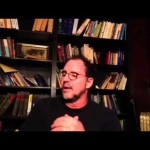We run our website the way we wished the whole internet worked: we provide high quality original content with no ads. We are funded solely by your direct support. Please consider supporting this project.

Why is the World Still So Messed Up?
Through the Incarnation, Jesus made a way for our union with God. In addition, Jesus’ death and resurrection defeated the powers of evil. This should then lead us to ask: Why do we have to continue to fight evil? In fact, if the powers are defeated, a more basic question is: Why is the world still so messed up?
The way the New Testament speaks about Jesus’ victory over evil is paradoxical. On the one hand, it celebrates Christ victory over the powers as something already accomplished—to the point where they are regarded as a disarmed laughing stock (Col. 2:14-15). At the same time, it speaks about these powers as on-going oppressive forces and depicts their ultimate demise as lying in the future.
For example, even after the resurrection Christians continued to have to heal people and cast out demons, just as Jesus did. Even after the resurrection, New Testament authors continue to speak of the world as governed by evil (Gal. 1:4; Eph. 5:16; 1 John 5:19). Even after the resurrection, the devil is said to be “a roaring lion” who “prowls around, looking for someone to devour” (1 Pet. 5:8). Even after the resurrection God’s adversary is called the “god of this world” who blinded the minds of unbelievers (2 Cor. 4:4) and “the tempter” who continues to influence people to sin (1 Thess. 3:5; 2 Cor. 11:3; 1 Cor. 7:5; Acts 5:3).
The powers of evil are defeated, and yet they are in the process of being defeated. This paradoxical state of affairs is the “already-not yet” tension of the New Testament’s eschatology. Jesus has already in principle established the kingdom of God and defeated all forces that resist it. But, at the same time, his victory is not yet manifested throughout the cosmos.
The most popular analogy describing this “already-not yet” paradox likens it to the interval of time between D-day and V-day in World War II. On June 6, 1944, the Allied forces stormed a beach in Normandy France and defeated German forces. Military historians generally agree that this victory swung the momentum of the war and ensured that the Allied forces would eventually win WWII. This battle came to be known as “D-day.” In principal, the Allied forces won the war when they won the battle at Normandy. Yet, it took about a year of further fighting before the Germans surrendered and V-day would be declared.
In the same way, Christ in principle defeated the powers with the unsurpassable love he unleashed through his incarnation, life, ministry, death and resurrection. D-day has been fought and won. But we are still waiting for V-day. In the mean time, there are many important battles to fight. Indeed, sometimes an enemy fights the hardest when they know their doom is certain.
The author of Hebrews illustrates the “already-not yet” paradox nicely when he says that God made humans “for a little while lower than the angels” and that in Christ he has “crowned them with glory and honor, subjecting all things under their feet.” Our position as rulers of creation has in principle been restored in Christ. But the author immediately goes on to add:
As it is, we do not yet see everything in subjection to them, but we do see Jesus, who for a little while was made lower than the angels, now crowned with glory and honor because of the suffering of death, so that by the grace of God he might taste death for everyone (Heb 2:7-9).
What is already true in principle, because of what Jesus has done, is not yet seen in the world. In Christ, everything has in principle been subjected to us once again, but we do not yet experience this subjection. Our position as rulers on the earth has in principle been restored, but we don’t yet see this restored rulership manifested. Among other things, we are yet under the bondage of death.
What we do see, however, is Jesus. As the firstborn of the coming humanity and as the first-fruit of the coming harvest, Jesus is the evidence that, despite appearances, humanity has indeed been restored. And he is the assurance that it won’t be long before this restoration is manifested as accomplished fact.
Photo credit: x1klima via VisualHunt.com / CC BY-ND
Category: General
Tags: Eschatology, Evil, Kingdom of God, Warfare Worldview
Topics: Spiritual Warfare, Cosmic Conflict
Related Reading

6 Things the Church Fathers Can Teach Us about Spiritual Warfare
Image by Christina Saint Marche via Flickr Unlike our thinking today about the source of good and evil in the world, the early church fathers, including Irenaus, Athenagorus, Origen, and others before Augustine, possessed a warfare worldview. Here are 6 ideas that are common in their writings: The Reality of the “World-in-Between” The church fathers assumed…

Do the Principalities & Powers Exist Within Space & Time?
In this episode Greg Answers: How do you fight, with a body bound to space and time, against something that doesn’t exist in space in time? Links: God at War Episode 34 http://traffic.libsyn.com/askgregboyd/Episode_0034.mp3

Typhoon Haiyan and “Natural” Evil
Greg recorded his thoughts a few days ago on Typhoon Haiyan and the reality of “natural” evil that’s not really natural at all. “This an enemy has done.” (Matthew 13:28)

The (Spiritual) War on Terror
Jesus’ ministry was a ministry not of resignation but of revolt. He was about revolting against the cruel tyranny of a world ruler (Satan) that was oppressing God’s people. He was about seeking to give back to people, and to win back for his Father, what the enemy had stolen and destroyed. He was about…

So Much Evil. Why?
In light of the profound evil being experienced by the people of Paris and countless other locations around the world, we thought we would raise again the question that many ask when things like this occur: Why? Of course, Greg has spent much of his writing and speaking energy addressing this. Here is a basic,…

How God Changes the World
All who place their trust in Jesus look forward to a day when he will return and fully establish the kingdom of God. When this happens, Scripture promises that everything will change. There will be no more sickness, death, hunger, natural disasters, violence, fear, heartaches, sin, or evil. There will be no more racism, nationalism,…
